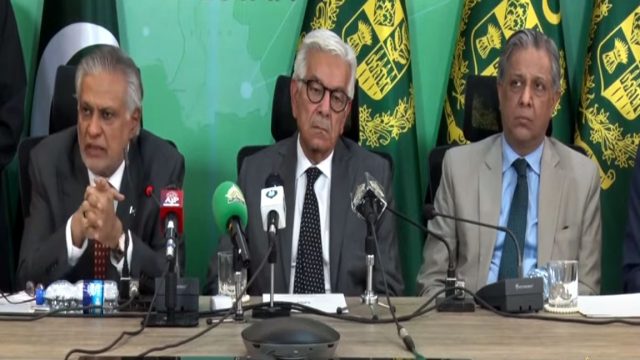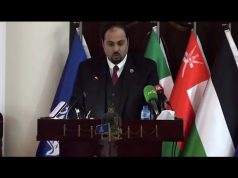ISLAMABAD, Thursday, April 24, 2025 (WNP): In a strong and coordinated policy response, Pakistan on Thursday announced a series of decisive countermeasures against India, following New Delhi’s unilateral move to suspend the Indus Waters Treaty—a move Islamabad has termed a “declaration of war.”
Deputy Prime Minister and Foreign Minister Senator Mohammad Ishaq Dar, flanked by key cabinet members, addressed a high-level press conference to brief the nation and international community on the decisions taken during the recent National Security Committee (NSC) meeting, chaired by Prime Minister Shehbaz Sharif and attended by the country’s civil and military leadership.
“Pakistan remains committed to regional peace and stability, but we are fully prepared to defend our sovereignty,” Dar said. “We are not seeking conflict, but any aggression will be met with a resolute and reciprocal response.”
Unilateral Treaty Suspension Condemned
Dar categorically rejected India’s announcement to place the 1960 Indus Waters Treaty in abeyance, calling it a blatant violation of international law and a reckless provocation. “The treaty, brokered by the World Bank, has been a rare symbol of cooperation between two adversarial neighbors. No clause allows unilateral suspension,” he said.
He warned that any Indian attempt to stop or divert Pakistan’s rightful share of water under the treaty would be considered an act of aggression and met with full force.
Sweeping Diplomatic and Economic Retaliation
Announcing immediate retaliatory measures, Dar declared:
The closure of the Attari-Wagah border and suspension of all cross-border transit.
Cancellation of all visas issued to Indian nationals under the SAARC Visa Exemption Scheme, except for Sikh religious pilgrims.
Declaration of Indian Defence, Naval, and Air Advisors as persona non grata, with orders to leave Pakistan by April 30.
A reduction in staff strength of the Indian High Commission in Islamabad to a maximum of 30 personnel.
Closure of Pakistani airspace to all Indian-owned or operated airlines.
Suspension of all trade and transit with India, including third-country routes.
“India has a long-standing history of manufacturing false flag operations and blame games to justify its aggression. The Pahalgam incident is no exception,” Dar asserted, alleging Indian intelligence support in orchestrating the recent attack in occupied Kashmir.
Warning on Simla Agreement and Diplomatic Outreach
Dar also warned that Pakistan may consider suspending other bilateral agreements, including the historic 1972 Simla Agreement, if India continues its unilateral provocations.
He emphasized that Pakistan had already briefed friendly nations and permanent members of the UN Security Council, proposing amendments to a draft UNSC resolution on regional peace and counter-terrorism. “Pakistan remains committed to multilateralism and diplomacy, but will defend its interests through all legal and strategic means,” he said.
UNSC Presidency and International Legal Route
Highlighting Pakistan’s diplomatic credentials, Dar announced that Pakistan had secured a seat on the United Nations Security Council for the 2025–2026 term with an overwhelming 182-vote majority and will assume the rotating presidency in July 2025.
Defense Minister Vows to Retaliate Decisively
Speaking at the press conference, Minister for Defence Khawaja Muhammad Asif accused India of sponsoring terrorism in Pakistan and using internal attacks as pretexts for policy moves.
“India has stationed nearly a million troops in Indian Illegally Occupied Jammu and Kashmir to suppress the voices of innocent Kashmiris,” he said. “Whenever India faces domestic unrest or elections, they trigger false narratives like the Pulwama attack. The same strategy is being used post-Pahalgam.”
He recalled how Pakistan’s military had shot down two Indian jets in 2019 after the Pulwama incident and reaffirmed that the country’s armed forces are ready to respond decisively to any future aggression.
“Pakistan will protect every inch of its land. We are not aggressors, but we will not allow our sovereignty to be violated,” Asif said.
India Sponsoring Terrorism: Ministers Assert
The ministers accused India of harboring and financing banned outfits like the Balochistan Liberation Army (BLA) and Tehrik-e-Taliban Pakistan (TTP), and cited the case of convicted Indian spy Kulbhushan Jadhav as evidence of India’s involvement in terrorism inside Pakistan.
“Canada and the UK have also exposed India’s global terror network,” Asif added.
Legal Stand on Indus Waters Treaty
Law Minister Senator Azam Nazeer Tarar emphasized that India has no legal right to unilaterally suspend the Indus Waters Treaty. “There is no provision in international law or the treaty itself that permits such action. This treaty, protected under the Vienna Convention, cannot be discarded at will.”
Attorney General Mansoor Usman Awan echoed the minister’s views, stating, “Unless a new treaty is negotiated, any changes or withdrawal from IWT are legally invalid. We will utilize all available international forums to defend our rights.”
Information Minister Denounces India’s ‘Childish’ Behavior
Information Minister Attaullah Tarar slammed India’s announcement as “childish and non-serious,” saying it reflected New Delhi’s ignorance of international accords.
He reaffirmed that all forms of trade with India, including third-party arrangements, had been suspended. “Closing airspace alone will cost Indian airlines millions. We have responded to their empty threats with concrete actions.”
Tarar praised Pakistani journalists for effectively countering Indian narratives in international media and reiterated that Pakistan’s position as a frontline state against terrorism was internationally acknowledged.
“India’s latest provocations are aimed at diverting global attention from its own failures and human rights abuses in Kashmir,” he said. “Pakistan’s firm response will show the world that peace cannot come at the cost of our sovereignty or dignity.”




